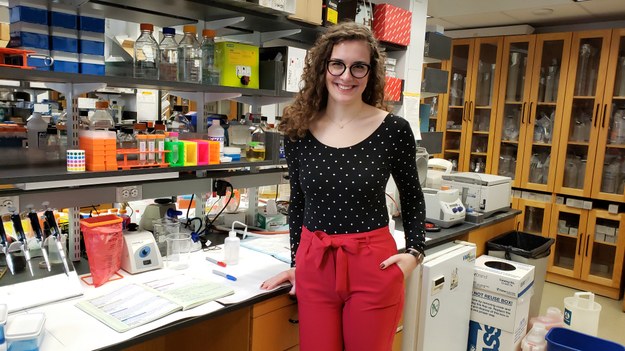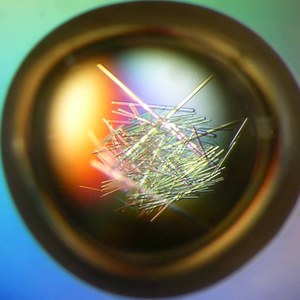From Albertov to Harvard – a tale from the laboratory of protein structures

You studied chemistry at our Faculty from your undergraduate days to the PhD degree you just recently obtained. How would you briefly describe your journey through the Faculty?
I began my undergraduate studies in the Chemistry in Natural Sciences study program, which is now simply called Chemistry. From the very beginning, I knew I would like to become a scientist, which is why I chose Charles University. I found the group of Prof. Tomáš Obšil at the Department of Physical and Macromolecular Chemistry on the web. During the interview before joining his group, he explained me his multi-disciplinary approach – I would first have to learn basic molecular biology and after that switch to the physical chemistry. I found this really exciting; in fact I was attending a physical chemistry course at that time, taught by Professors Gaš and Vohlídal. I really liked the field as well as the opportunity to connect it with biology and I have decided this would be the right lab for me.
I've heard that working in Professor Obšil's group is quite specific. In what ways?
Prof. Obšil's group is attractive because of its multi-disciplinary focus. Although it is at the Department of Physical Chemistry, it is also tightly connected to the structural biology field. He collaborates closely with his wife's group, which recently moved from the Institute of Physiology at the Czech Academy of Sciences in Krč to BIOCEV. Within this cooperation we often carried out the first part of the experiment, usually a bacterial protein expression, over there, and then we would come back to the faculty and continue with our experiments using the tools of physical chemistry. I have stayed in his lab even during my master's studies, while my thesis project became a real challenge. The work I was doing turned out to be so challenging and fascinating that I unsurprisingly pursued it during the doctoral stage of my studies.
Did you work with crystallography, as is common in the Professor Obšil's group?
Tomáš Obšil is an expert in protein X-ray crystallography and at the time I was trying to characterize my protein using crystallography. However, this was not feasible, so I applied for the grant at the Charles University Grant Agency (GA UK) to fund my idea of solving the problem using NMR (Nuclear Magnetic Resonance) spectroscopy. I received the grant and could therefore leave for a short internship in the Václav Veverka’s group at the Institute of Organic Chemistry and Biochemistry (IOCB) of the Czech Academy of Sciences, where I have learned everything I needed to master this experimental method.

Were you interested in studying abroad?
Yes, I was. Thanks to the grant I could travel abroad to a number of conferences, usually focused on advances in the field of NMR spectroscopy. Last year, I decided to find an internship that would lead me back to crystallography. Tomáš Obšil recommended me that I should contact his colleagues in Washington, D.C. at the National Institute of Health (NIH), where he worked as a post-doctoral fellow, and to sort out a short-term research stay right there. I knew that I only had a few weeks to master the basic methods due to other responsibilities before finishing my PhD. First, I have started looking for a funding route to cover the expenses for the internship. I applied to the Mobility Fund, the Internationalisation Fund and the CU Faculty of Science Endowment Fund. I eventually obtained funding from all three sources and when I recieved the acceptance letter from the NIH, I bought the flight tickets and headed to America. My stay was successful, I have achieved my crystallographic goals. I enjoyed working in the United States and therefore immediately started looking for a post-doctoral fellowship at the East coast.
What kind of a strategy did you use in your search?
My colleagues advised me to look for a group where I could change the field of my expertise and further expand my knowledge that will be instrumental for my future scientific career. Initially, none of the groups I have applied to responded, perhaps due to my plan to change my research area. So, I changed the strategy, and in addition to my professional CV, I have started preparing research proposals, emphasizing the fact that the entire group could benefit from my experience in structural biology and my knowledge of physical chemistry. With this key addition, I received several responses, two of which were very positive. I had Skype interviews and in both cases I was invited for a personal interview to Boston, as both laboratories were at Harvard University. After several hours of interviews, I have returned to Washington and then finally back to Prague. Two weeks later, I received the offer from Professor Danesh Moazed from Harvard Medical School.

Did you have to radically change your plans in Prague because of this?
Honestly, I didn't expect things to move so quickly. The laboratory in the US wanted me to start as soon as possible, while my advisor here preferred me to stay in Prague as long as possible. I was working with Tomáš Obšil on several projects that we needed to finish before completing my PhD studies. I did find a compromise between the two, and defended my PhD thesis on 26th February. Right after that, I terminaetd my employment at the Charles University, flew to the US and started working at Harvard.
Do you have any advice for those following in your footsteps? Something you know now that your younger colleagues might not?
From my own experience I must say that the hardest thing is to find the courage to make the first step. Even asking one of the professors for advice. They are the ones who directed me to the right department at our faculty (Department of Project Management) and also advised me to submit an application to the Faculty Endowment Fund. So, if I can recommend one thing, never postpone the first step. Once you make the decision, you’ll be surprised about how many opportunities there are for students and recent graduates today. Anyways, I've been trying to advise my younger sister Karolína, who will be finishing her first year of undergraduate studies in Medicinal Chemistry at our faculty soon. One Pšenáková leaves, another arrives.
Interviewed by: Michal Andrle
Document Actions